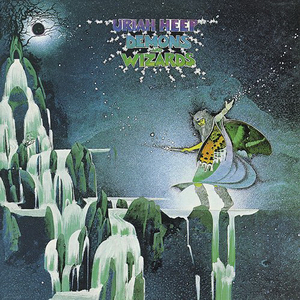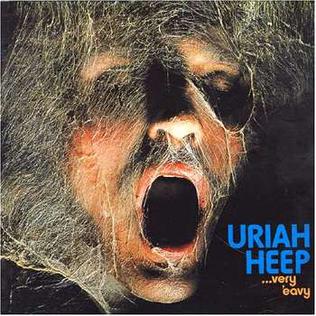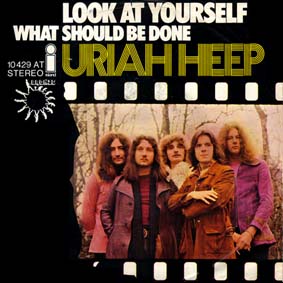
Uriah Heep are an English rock band formed in London in 1969. Their current lineup consists of guitarist Mick Box, keyboardist Phil Lanzon, lead vocalist Bernie Shaw, drummer Russell Gilbrook, and bassist Dave Rimmer. They have experienced numerous lineup changes throughout their 56-year career, leaving Box as the only remaining original member. Former members of the band are vocalists David Byron, John Lawton, John Sloman and Peter Goalby; bassists Paul Newton, Mark Clarke, Gary Thain, John Wetton, Trevor Bolder and Bob Daisley; drummers Alex Napier, Nigel Olsson, Keith Baker, Iain Clark, Lee Kerslake and Chris Slade; and keyboardists Ken Hensley, Gregg Dechert and John Sinclair.

Kenneth William David Hensley was an English musician, singer, songwriter and producer, best known for his work with Uriah Heep during the 1970s.

David Garrick, better known by his stage name David Byron, was a British singer, who was best known in the early 1970s as the original lead vocalist of the rock band Uriah Heep. Byron possessed a powerful operatic voice and a flamboyant stage presence.

Salisbury is the second studio album by English rock band Uriah Heep, released in January 1971 by Vertigo Records in the UK and Mercury Records in the US. It was produced by Gerry Bron.

Demons and Wizards is the fourth studio album by English rock band Uriah Heep, released in May 1972 by Bronze Records in the UK and Mercury Records in the US.

Return to Fantasy is the eighth studio album by English rock band Uriah Heep, released on 13 June 1975 by Bronze Records in the UK and Warner Bros. Records in the US. It was the first of the two albums to feature John Wetton as the new bass player, who replaced Gary Thain in early 1975.

Michael Frederick Box is an English musician who is the lead guitarist of rock group Uriah Heep, having previously been a member of The Stalkers and Spice, both with original Uriah Heep vocalist David Byron. He is the only member from the band's founding in 1969 who is still active with the group, and – following the deaths of Lee Kerslake and Ken Hensley in 2020 – is also the last surviving member of the group's classic line-up.

High and Mighty is the ninth studio album by English rock band Uriah Heep, released in May 1976 by Bronze Records in the UK and Warner Bros. Records in the US. High and Mighty was the last Uriah Heep album to feature bassist John Wetton, and vocalist and founding member David Byron who was fired later that year due to his troubles with alcohol and differences with band priorities.

"The Wizard" is a song by British rock band Uriah Heep, from their 1972 album Demons and Wizards. It was the first single to be lifted from the album. It was composed by Mark Clarke and Ken Hensley. It is a gentle, semi-acoustic ballad whose lyrics deal with a wanderer meeting "the Wizard of a thousand kings". This song is the first Uriah Heep single which had a music video.

"July Morning" is a song by the English rock band Uriah Heep. It is the third track on their 1971 album Look at Yourself.

The Lansdowne Tapes is a compilation album by the British rock band Uriah Heep and released in 1993. The recordings featured on the album date from the time before the change of name to Uriah Heep and during the early sessions that culminated in material eventually used on the band’s debut album.

...Very 'Eavy ...Very 'Umble is the debut studio album by English rock band Uriah Heep. It is recognized as a foundational album in heavy metal music.

The Best of Uriah Heep is the title of the most successful compilation album by the British rock band Uriah Heep. It was released by Bronze Records and Mercury Records in three distinct editions with roughly the same songs, but different cover art and track listing. The first edition was released in 1974 in Canada, the second in 1975 in Europe and the third the following year in the US. Some European editions had the song "Lady in Black" substituted by "Suicidal Man". The compilation reached gold status in Germany.

"Look at Yourself" is a song by British rock band Uriah Heep, originally released in 1971 on their third studio album, Look at Yourself, and the same month as a single, the first by the band in the United Kingdom. It was written and sung by Ken Hensley.
"Blind Eye" is a song by the British band Uriah Heep, which was originally released on their fifth studio album The Magician's Birthday in 1972, and the B-side of the "Sweet Lorraine" single. "Blind Eye" was written by Ken Hensley. It charted at #97 in the U.S. Billboard Hot 100. It was included on Uriah Heep's live album Acoustically Driven in 2001. The song was recorded and mixed at Lansdowne Studios, London, in September 1972.

"Something or Nothing" is a song by British rock band Uriah Heep. The song was written by Ken Hensley, Mick Box and Gary Thain and sung by David Byron. The song is the sixth track on their seventh album Wonderworld, it is also the first track on the second side of the album. "Something or Nothing" was recorded at Musicland Studios in Munich, Germany during January and March 1974. The B-side of the song is "What Can I Do" which has never been released on the album "Wonderworld". The song is being played with only four chords: D,A,C and G. The song has been performed during Uriah Heep live concerts, and was included on their second live album Live at Shepperton '74 as the fourth track.

"Prima Donna" is a song by British rock band Uriah Heep from their eighth studio album Return to Fantasy (1975), released as the first single from the album. The song was written by David Byron, Mick Box, Lee Kerslake and Ken Hensley. It was recorded in May 1975 in Lansdowne and Morgan Studios, London. The song reached number ten in Denmark and number three in Norway.

"One Way or Another" is a song by English rock band Uriah Heep. It was released on their ninth studio album High and Mighty in May 1976, and became the only single from the album and the last single with the band's former vocalist, David Byron. The song was written by Ken Hensley and featured lead vocals from John Wetton and Ken Hensley. It was recorded from December 1975 to March 1976 in Roundhouse Recording Studios in London. The single did not chart, and it is the only song on the album that was not sung by David Byron.
Sunrise is a song by the British rock band Uriah Heep, originally released on their fifth studio album, The Magician's Birthday, in 1972. The song was written by Ken Hensley and sung by David Byron. The song is considered one of the band's classics, and it also became famous for its live performances in late 1972 and 1973. It was included, as the opening track, on the band's first ever live album, Uriah Heep Live, in 1973. The song was recorded and mixed at Lansdowne Studios, London, in September 1972, and released on The Magician's Birthday in November of the same year. The song is also the B-side of the single "Spider Woman".
"Rain" is a song by the English progressive rock/hard rock band Uriah Heep, which was originally released on their fifth studio album, The Magician's Birthday, in 1972. Though the song was never released as a single, it is one of the most well-known songs from the album. It was written by Ken Hensley, who also performed the keyboard/piano element of the song, with vocals by David Byron. It was the band's first song to use only the keyboards/piano and vocals with some additional bass guitar parts. AllMusic said the song was a "lovely piano ballad". Songwriter Hensley recorded a slightly different version for inclusion on his 1973 debut solo album Proud Words on a Dusty Shelf.

















